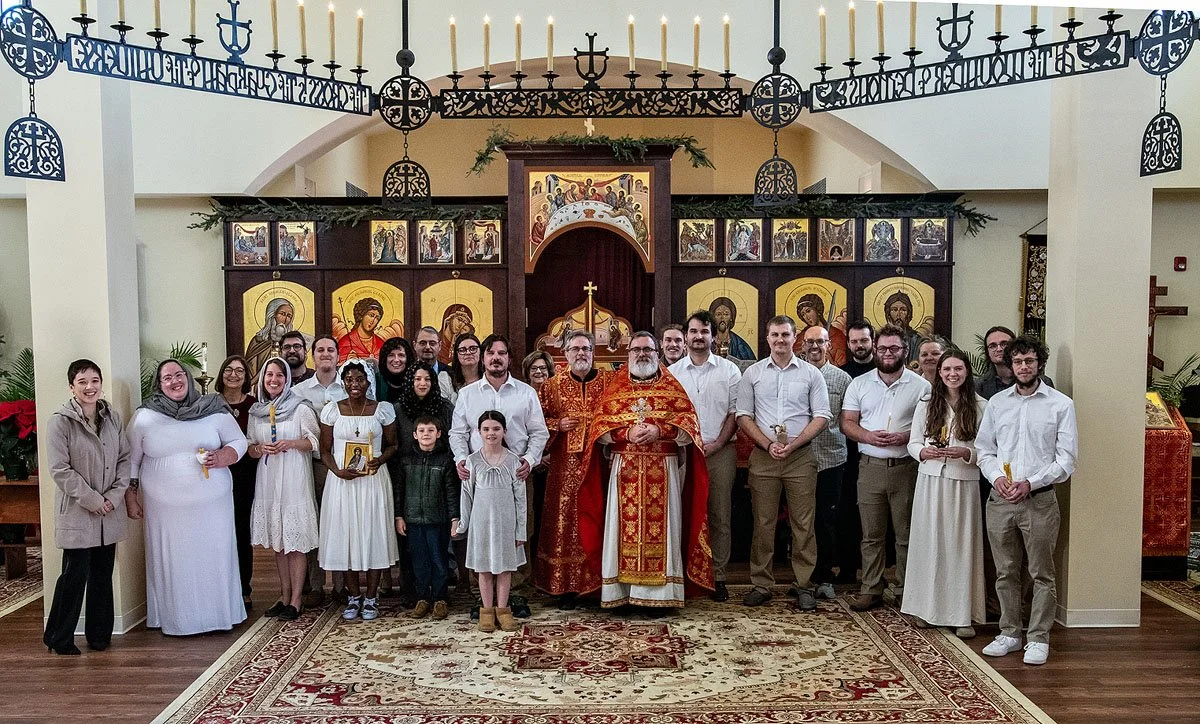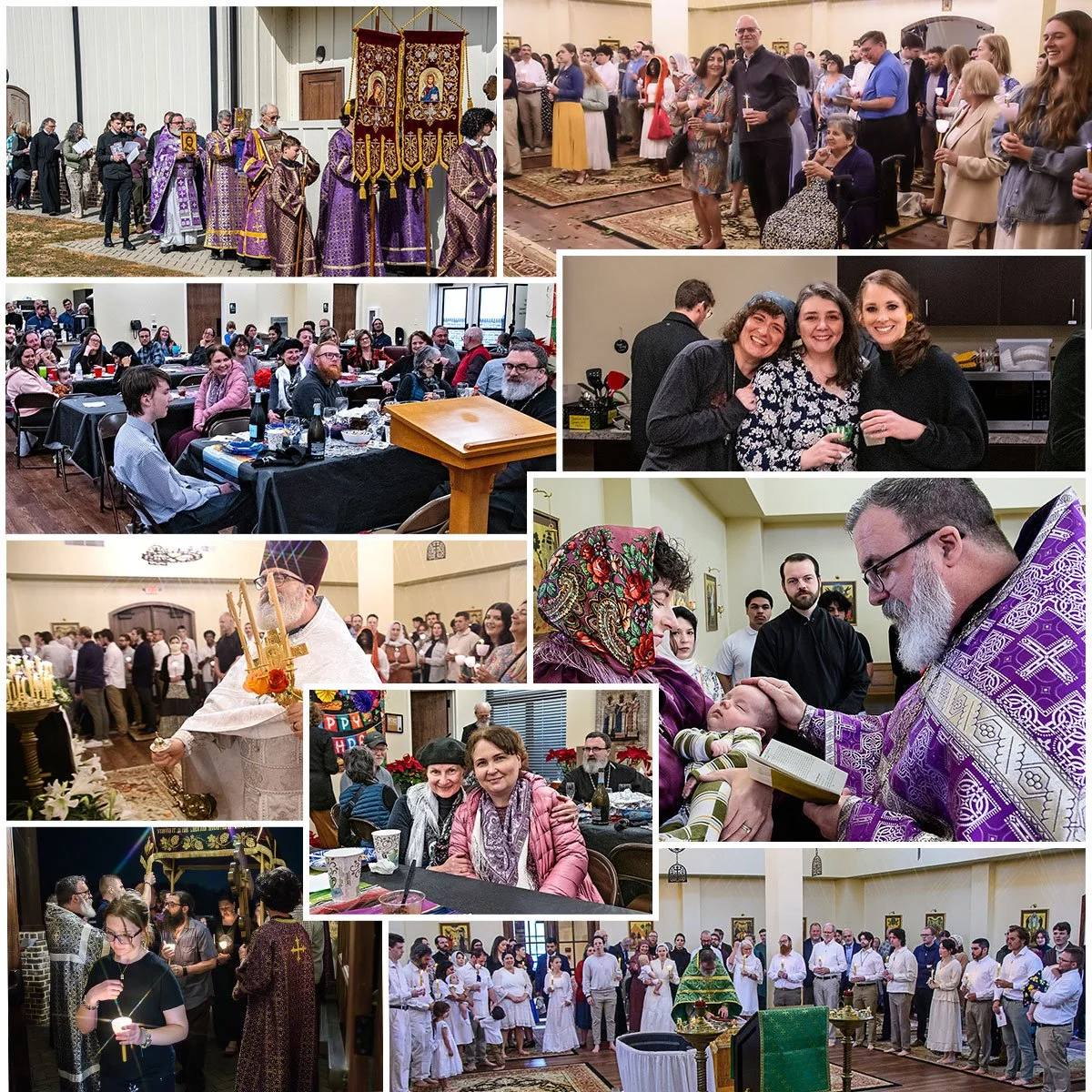Resources

Many informative articles were published in our parish newsletters in the years prior to Covid. Email to the friends and faithful of Holy Cross has replaced our newsletters, but many of the articles are collected here. Use the indexes below to find the topic or author you’re interested in. (Once you click on a topic or author, scroll to the bottom of the page to see the search results.)
Also, have a look at the Recommended Readings on the OCA (Orthodox Church in America) website for a list of books covering a wide range of topics. Essential Orthodox Christian Beliefs: A Manual for Adult Instruction is also available for free download on the OCA’s website.
(Speaking of our parent jurisdiction, the OCA traces its origins to the arrival in Kodiak, Alaska in 1794 of eight Orthodox missionaries from the Valaamo Monastery in the northern Karelia region of Russia. Today, the OCA includes some 700 parishes, missions, communities, monasteries, and institutions throughout the United States, Canada, and Mexico.)
We hope you’ll find these suggested readings to be both edifying and encouraging!
By Author
- Alexander Bogolepov
- Benjamin D. Williams
- Elder Paisios
- Fr Alexander Schmemann
- Fr Alexander Shargunov
- Fr Alexis Trader
- Fr Apostolos Hill
- Fr Christopher Foley
- Fr George Morelli
- Fr John Breck
- Fr John Ealy
- Fr John Mefrige
- Fr Kyrill Williams
- Fr Michael Oleksa
- Fr Michael Plekon
- Fr Richard Rene
- Fr Stephen Freeman
- Fr Thomas Hopko
- Hieromonk Calinic (Berger)
- John Boojamra
- Metropolitan Jonah
- Mtk Deborah Belonick
- Mtk Dennise Kraus
- St Innocent of Alaska
- St John Chrysostom
- St John of Kronstadt
By Topic
- Baptism
- Bible
- Biography
- Conciliarity
- Confession
- Death
- Diocese of the South
- Eucharist
- Evangelism
- Fasting
- Forgiveness
- Giving
- Hell
- Holy Fathers
- Holy Friday
- Holy Saturday
- House of God
- Hymnography
- Life as sacrament
- Liturgy
- Love
- Marriage
- Mother Maria Skobtsova
- Nativity
- OCA
- Pascha
- Peacemaking
- Practices
- Prayer
- Pregnancy
- Priesthood
- Repentance
- Resurrection
- Salvation
- Sickness
- Sin
- Spiritual Reading
- Standing
- Stewardship
- Suffering
- The Cross
- The Theotokos
- Theophany
- Unction
- Worship
Guarding the Thoughts, Guarding the Heart
It all begins with an idea.
TOPICAL INDEX
- Baptism
- Bible
- Biography
- Conciliarity
- Confession
- Death
- Diocese of the South
- Eucharist
- Evangelism
- Fasting
- Forgiveness
- Giving
- Hell
- Holy Fathers
- Holy Friday
- Holy Saturday
- House of God
- Hymnography
- Life as sacrament
- Liturgy
- Love
- Marriage
- Mother Maria Skobtsova
- Nativity
- OCA
- Pascha
- Peacemaking
- Practices
- Prayer
- Pregnancy
- Priesthood
- Repentance
- Resurrection
- Salvation
- Sickness
- Sin
- Spiritual Reading
- Standing
- Stewardship
- Suffering
- The Cross
- The Theotokos
- Theophany
- Unction
- Worship
Hieromonk Calinic (Berger)
September 2011
One of the major themes in the Philokalia and the writings of the Holy Fathers in general is that of the “guarding of thoughts.” A thought is a seed which, when planted in the heart, can affect the totality of not only how we act, but of our entire attitude towards life, towards a particular situation, towards others and even towards ourselves. Thoughts are powerful, and can either motivate us or totally discourage us.
For this reason, the Orthodox Fathers placed great emphasis on the guarding of the thoughts and the guarding of the heart. They recommend a constant vigilance over oneself effected by perpetually standing before God in the depth of one’s heart. Here, each thought is brought before Christ to be judged. Unworthy thoughts are expelled from the mind. More simply, we need to pay attention to our inner monologue. If we give place to negative or defeatist thoughts, they will become a prophecy that we ourselves will fulfill.
Prayer is the greatest aid to maintaining positive thoughts. When we invite God into any situation, He will come – and His presence is always one of power, energy and light. He may not reveal Himself immediately, but He is not absent from that moment forward. An old saying goes, “the Lord may not come when you want Him to, but He’s always right on time.” But it is up to us to invite him. A simple “Lord have mercy,” or “Lord Jesus Christ, Son of God, have mercy on me, a sinner” is powerful enough to do this.
Prayer cracks the stronghold of negative or defeatist thinking. God is all-powerful. He created the world out of nothing. There is no situation in our lives too difficult, nor too trivial, for God’s help and action. But again, it’s up to us to make the first move, and to persist in our supplications.
Discouraging thoughts are not necessarily irrational. Often, they are mixed with truths, or half-truths. Sometimes thoughts come to us from others, sometimes from ourselves. But what others think is ultimately meaningless. Only God’s “opinion” matters. Take, for example, both Joseph and David. Both were called by God to be kings, yet both came from large families in which their own brothers and parents did not believe in their calling or abilities. Both were unjustly accused; one imprisoned, the other persecuted. Yet by keeping their eyes focused on God, they did what no one thought they could do. They overcame the negativity and discouragement of others.
Often, however, our own thoughts are more difficult to conquer than those coming from others. Here we only wrestle with ourselves. This is why prayer is so important – prayer is the bringing in of another, independent perspective: that of God.
How do we know if thoughts come to us from God, or from the devil? What should we do if thoughts of our failings and sins are presented to us? The Fathers give a simple rule: if the thought of a past failing discourages us to the point of depression, draining all our energy and zeal, tempting us to quit every struggle for virtue, or to remain complacent, it is from the devil. If, however, the sorrow such a thought brings gives us a desire to change, energy to repent, fast, pray, forgive, etc., it is from God. St Paul himself talks about these two sorrows: one which is worldly, and brings death; one which is godly, and brings zeal and energy to change (2 Cor 7:10).
If we turn our thoughts over to God for His judgment, they become pure, and catalysts to a correctly ordered life. More than this, healthy even in the midst of great trials. Only a soul filled with God’s love is such, and the first step is in our thinking. Love for God leads to pure thinking, and vice versa. “Love is essentially the banishment of every kind of contrary thought, for love thinks no evil (I Cor 13:5),” wrote St John of the Ladder.
Our thoughts must be turned over to God, such that their effects will be positive. Yes, we need to encourage ourselves in our inner monologue, but most importantly, we need to bring God into our thinking and hearts by prayer. Then our thoughts will become seeds of transformation and victory in our lives, aiding and abetting us to fulfill God’s purposes.
The article above is by the pastor of the Holy Cross Orthodox Church in Hermitage, PA, the Rev. Hieromonk Calinic (Berger), from his column in Solia, the diocesan publication of the Romanian Orthodox Episcopate of America: http://www.holycrosshermitagepa.org/files/2008_01_GuardingThoughts.pdf (Link now broken)

